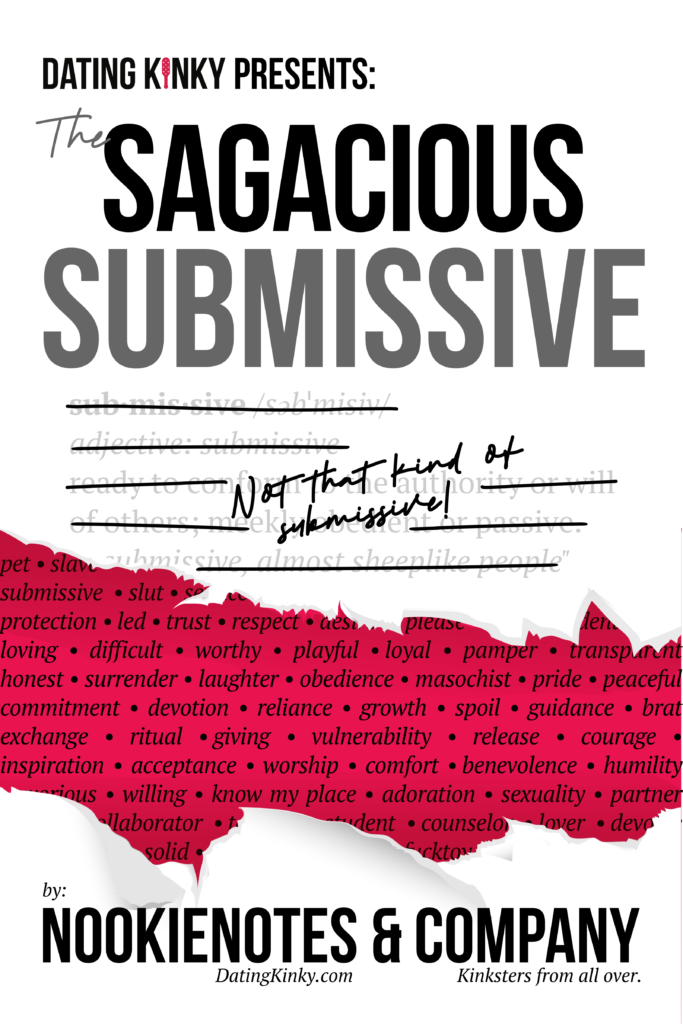My book for this month is about submission, and the amazing people who choose submission as their role in power exchange relationships.
Because the submissives in my life are freaking amazing people, who serve with love and intention, and I want to give back to others like them everywhere.

I’ll be the first to say that what I’m about to write would work for ANYONE who is wanting to set and/or maintain better boundaries.
Boundaries are boundaries, after all.
I’m writing specifically to submissives right now, to tackle the task of setting boundaries when your core drive is to please and serve.
Most people have this drive to some degree.
Hell, I think of dominance as being a servant to my people and getting blow jobs on command.
Seems a fair exchange to me.
LOL!
For those, though, who align their entire lives with serving and pleasing, sometimes setting boundaries can be even more challenging, especially when there are outside influences claiming what is or is not submissive, or what a submissive should or should not do.
And that’s where this piece comes into play.
A few years back, I wrote the piece that would, unbeknownst to me, become the core of my personal boundaries philosophy: No Regrets
I still share it with people in conversation, and think about it regularly.
Writing it and spelling it out clarified the idea for me, and made it that much more natural to both think and live.
And again, it’s NOT just for submissives.
However, I’ve found the ideas that have developed from it to work wonders in communicating to submissives how to think through their choices when faced with a potential boundary violation (from others, or most often from themselves).
So, I’m going to break it down.
Don’t do anything you will regret.
Simple, huh?
Actually, that’s pretty much what the original writing was, with a few examples.
However, in the nearly 5 years since I wrote that, I’ve gotten a lot of questions on just HOW to put that into practice.
So, let’s start.
Sorry, this is gonna get a bit long.
But the length is in the details and steps, so ultimately, I think it’s worth it. Hopefully, you will, too.
First, you set your boundaries.
Also simple, but not as easy for some as for others.
How do we know what our boundaries are? How do we set them?
Let me break it down.
Boundaries are personal limits.
In my book Understand Me Now—And that’s an order! I have an entire section on boundaries. I’m going to slightly abridge that, but know that it’s there if you want to know more. We also host a monthly show with Hardy Brooklyn on Dating Kinky about boundaries and consent, and have a book coming up in September, More Than Yes or No, focused on consent and negotiation.
There are six primary types of boundaries:
Physical Boundaries: Personal Space and Physical Touch
Healthy physical boundaries: an awareness of what works for you and what does not in various situations and types of relationships. For example, when do you verbally greet, hug or kiss your partner(s) when meeting?
Boundary violations: occur when someone touches you when you don’t want to be touched (or to be touched by them) and when they invade your personal space (like going through your closet or medicine cabinet).
Intellectual Boundaries: Thoughts and Ideas
Healthy intellectual boundaries: understanding where your ideas and thoughts begin and another’s leaves off. Knowing what feels right for you to share about your thoughts in various situations and types of relationships. For example, when do you speak of a new theory you’ve been developing, or an invention you’re working on?
Boundary violations: when someone dismisses or belittles your ideas and presented thoughts. Also, you can violate your own personal boundaries by sharing too much too soon or with the wrong people, and subjecting yourself to theft of ideas or fraud.
Emotional Boundaries: Feelings
Healthy emotional boundaries: recognizing your feelings as yours and not leakage or influence from another, and knowing when it is right to share them. For example, when do you speak of emotional trauma or your feelings during the development of a relationship, and when do you prefer to keep things light?
Boundary violations: occur when someone probes insistently despite your attempts to demur. Or when someone criticizes, invalidates or mocks your feelings. Also, you can violate your own personal boundaries by sharing too much too soon or with the wrong people, and leaving yourself feeling exposed, raw and wrong.
Sexual Boundaries: Emotional, Intellectual, and Physical Aspects of Sexuality
Healthy sexual boundaries: knowing and respecting your personal limitations, desires and ability to consent, and granting that same respect to others’ sexuality. For example, being clear with your likes and dislikes, and asking after theirs.
Boundary violations: occur with unwanted sexual touch, pressure to engage in sexual acts, leering, or sexual comments outside of consensual situations.
Material Boundaries: Money and Possessions
Healthy material boundaries: choosing your limits on what you will share or give with and to whom. For example, you may lend money to a friend or family member, but not to a stranger you met at the bar tonight.
Boundary violations: occur when someone steals or damages another person’s possessions, or when they pressure them to give or lend them their possessions.
Time Boundaries: Use of Time
Healthy time boundaries: setting aside time for the priorities in your life: work, love, hobbies, personal care, family, volunteering and so on.
Boundary violations: occur when a person or entity (I’m looking at you, workspace!) demands too much or more than their share of a person’s time.
Only YOU get to decide what your boundaries are in any given situation, and they will probably be different with different people, in different situations, and over the course of your life.
Boundaries are constantly evolving and changing.
And that’s OK.
Because we don’t necessarily want things to be set in stone (except for my dislike of radishes—I’d build a marble fucking monument to that shit!).
Ahem.
Next, you apply your boundaries to whatever situation might come along.
This doesn’t mean to force your existing boundary onto the situation, but to put to or adapt for a special use. (source)
In other words, compare your boundary to the situation. Ask yourself these questions:
- Does it apply?
- What are the potential costs of removing my boundary?
- What are the potential benefits?
- Am I willing to remove my boundary for this situation?
- Will I regret this? (Will I regret this if the benefits do not materialize? Will you regret doing it? Will you regret NOT doing it?)
Let’s look at those more closely with a few common examples taken from actual submissives over the years.
Example A: Having sex.
Or allowing a certain type of play, or having a scene or whatever. Something that might violate your healthy sexual boundaries.
This would include moving faster towards an intimate sexual relationship than you might feel comfortable doing. Or giving in to a certain type of play to please a dominant personality you might like.
Let’s break it down:
You meet someone and hit it off.
You are looking forward to really getting to know them over a few months before any intimate play.
They are more interested in checking your play and sexuality compatibility before spending a lot of time emotionally and intellectually.
BOTH of you are right for yourselves.
But it does create an impasse.
Does my boundary apply? In this case, it’s pretty clear that it does. And how!
What are the potential costs of removing my boundary? Well, you could feel uncomfortable, which is really not a good experience during sex. And the sex might not be as good, if you are not 100% into the moment.
What are the potential benefits? Well, sex. After all, you like sex, too. And this dominant boopsie. You REALLY like them. If you hit it off, you may create a relationship with all the potential you’re seeing. And that’s fucking hot.
Am I willing to remove my boundary for this situation? If this is a “no,” then you’re done. If it’s a “yes,” you have one more question (well, one and a possible sub question).
Will I regret this? If the answer is “no,” great! If it’s affirmative, then the next question might be: “Is there anything I can think or do that would change that answer or my regret?”
Example B: Giving or lending money.
Or anything that might violate your healthy material boundaries or put you at a loss.
Giving or lending money seems obvious, as does any sort of payment in tribute or gifts, but also things like buying a lot of toys or equipment for others’ enjoyment. Lingerie can be pricey, and high heels. Strapons and dildos—the good ones—are costly. And floggers and whips made well.
Does my boundary apply? Maybe, maybe not. I loan or give money when I have it. I don’t mind. Some people have strong feelings about that.
What are the potential costs of removing my boundary? Could you find yourself short on funds (like for paying bills)? Especially if they don’t pay you back? Could you lose a friendship? What if you feel cheated?
What are the potential benefits? Well, you get to feel good for helping someone. You might get something (like attention or ROI, Return On Investment) for your money.
Am I willing to remove my boundary for this situation? If this is a “no,” then you’re done. If it’s a “yes,” you have one more question (well, one and a possible sub question).
Will I regret this? If the answer is “no,” great! If it’s affirmative, then the next question might be: “Is there anything I can think or do that would change that answer or my regret?”
In this case, if your regret is a “maybe, if they don’t pay me back,” then the answer is a “yes.” Maybes in regret round up, LOL! Because as Murphy said, “Anything that can go wrong will go wrong,” and when it comes to loaning or giving money, I think the liklihood goes up by a factor of at least 10.
So, then you might ask, “Is there anything I can think or do that would change that answer or my regret?” And one possible answer might be, “I can give this as a gift, and if something comes back to me, it will be a bonus.”
Example C: Performing an inconvenient service.
Something that you have to go out of your way for or commit over time to. Anything that could violate your healthy use of time boundaries.
Do you have to learn a new skill to make this happen? Or are you committing hundreds of hours by saying “yes”? Do you have to drive 30 minutes out of your way on an evening when self-care would be the best thing for you?
Does my boundary apply? In this case, there could be no boundary, just a desire—which is still valid, BTW.
What are the potential costs of removing my boundary? You’re tired tomorrow, because you won’t really get to recharge the way you need to—and you have a big day. You will resent the person asking this of you, because it’s “too much.”
What are the potential benefits? Well, you like making people happy, so you get to do that. And feeling useful, also a good thing. And it might show that you’re really serious and truly submissive to that dominant you’ve been eyeing…
Am I willing to remove my boundary for this situation? If this is a “no,” then you’re done. If it’s a “yes, you have one more question (well, one and a possible sub question).
Will I regret this? If the answer is “no,” great! It’s it’s affirmative, then the next question might be: “Is there anything I can think or do that would change that answer or my regret?” In a case like this, maybe shifting your focus from what the result might be to whether the benefits of the process might be worth it for you, even aside from the inconvenience.
Another way to look at it is, “This person has provided so much value to my life so far, that even if they choose to hate me the moment I complete XYZ, I will have still benefited from our relationship and my choice.”
And it will take only a few minutes. A short enough time that you can say, “give me a minute to think about this,” or, “I’ll be right back, I need to go to the restroom,” or “…” while you type a few letters in your text and erase them over and over, so they think you’re typing…
Or whatever it is you do to stall for time.
Only YOU can make these decisions for yourself.
No one else can tell you how you’re going to feel, or what is right for you.
Hell, sometimes YOU can’t even tell for sure.
I rarely regret my choices anymore.
I have made mistakes, though.
And I’ve failed to consider angles that caused me or someone else pain. Usually because I didn’t have any experiences (or warnings) to even know I SHOULD consider those angles. So, I don’t regret those things. I learned from them, after all.
And, as a close friend of mine has said, “It’s a bad decision in pretty much all the ways it can be a bad decision, but I’ll have no regrets.”
And that is valid, as well.
That friend also learned a lot. LOL!
With submission, it’s often about balancing how much of yourself you can give with how much you are filled up by the results or by other things in your life.
Which is why these questions help.
“What will it cost me?” is worth paying attention to, because if the benefits don’t happen, who or what will fill you up? How will you replace that amazing service and pleasing energy?
And will you be the same, after?
Because regret tends to make us sad, angry, or bitter, and often a combination of all three.
And if you’re already regretful, will something going wrong here be a breaking point for you? Will it hurt too much for you to bear right now?
This matters.
Because submissives could often find themselves giving everyone else what fills those people up, while starving themselves.
And I’m on a personal campaign to end that shit.
Choose people and things that FILL YOU UP.
And do things and make choices that will fill you even if the worst happens.
And surround yourself with people who can fill you up when you make an error in calculations.
But don’t take them for granted.
Just like I don’t want anyone to take you and what you offer for granted.
Don’t do that to others.
Fill them up.
Do rely on them, or feel entitled to their emotional labor.
And make the best choices you can, for you. So you don’t have to use their emotional labor all the time. And to lead by example.
But mostly do it for you.
You deserve it.










